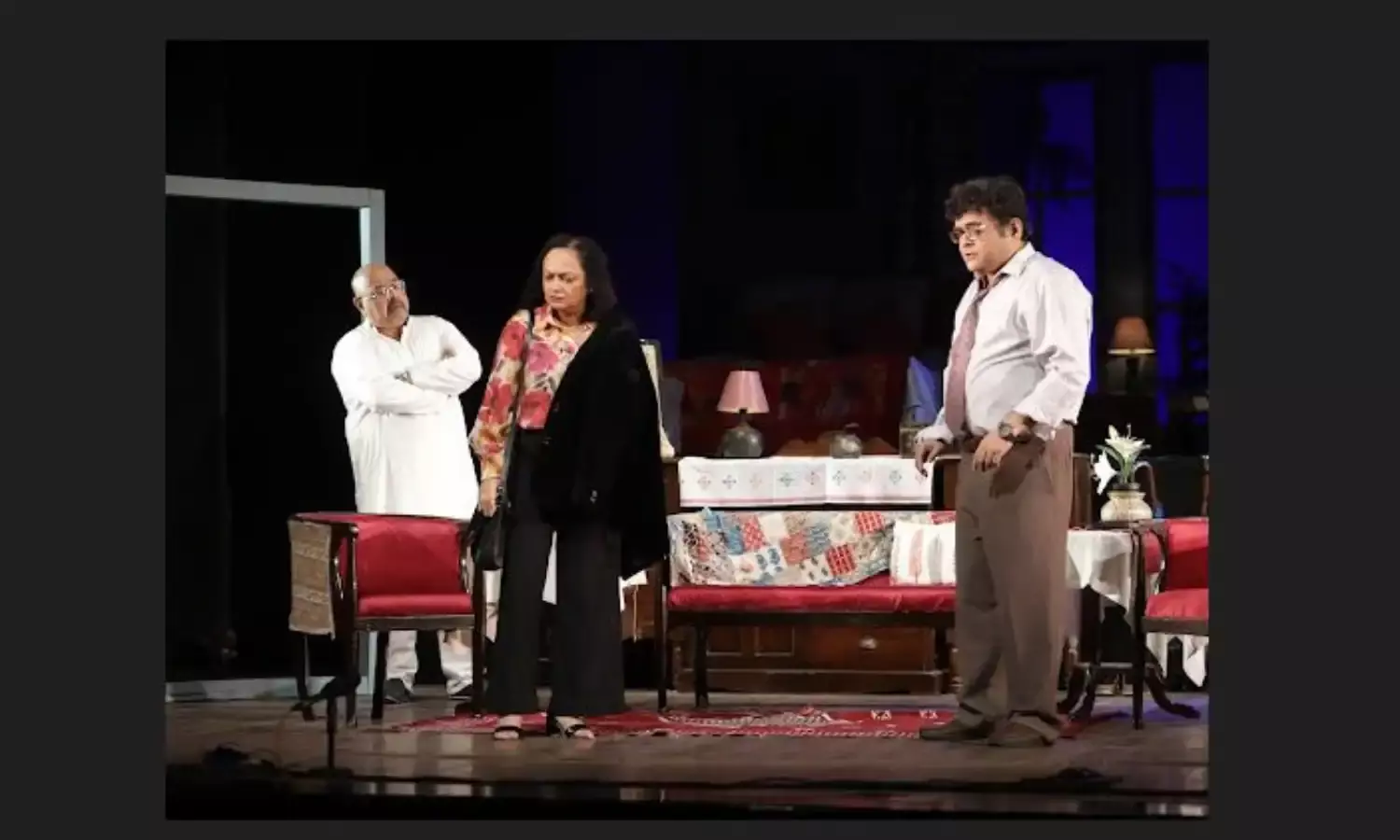Where There’s A Will
Mahesh Dattani’s biting satire

The Calcutta Club recently presented a theatrical performance in English of Mahesh Dattani’s biting satire on a Gujarati family, Where There’s A Will at a Kolkata theatre. The play was directed by Pradip Mitra who is an established actor-director in English theatre in Kolkata over a couple of decades now.
The choice of staging Where There’s A Will posed a kind of challenge because it is not a straightforward play but through humor, pokes directly at several “family” negatives. It particularly hints at what happens when the multi-millionnaire of the family’s scion, Hasmukh Mehta (Atri Bhattacharya) dies suddenly but can actually witness what is going on after his death.
The “Will” in the title therefore, a double-egded knife that cuts sharply at both ways – especially with reference to the real value of the head of a family to his successors after his sudden demise.
Is human relationship linked only to the money a senior male member can leave behind for their successors? Or is there an emotional involvement too? What are the mental debates involved in the male member’s decision to divide his wealth among his heirs? Where does his wife stand in the midst of all this?
All that remains of Hasmukh Bhai is a garlanded photograph that stands prominently in the centre of the stage while, invisible to the rest of the family, he observes the members’ response to his demise and more importantly, to the wealth he has left behind.
After the death of Hasmukh Mehta, his wife, son and daughter-in-law blame one another. There are no documents to prove the existence of a Will so they keep on blaming Hasmukh Mehta for this while his ghost watches all this, unknown to them.
An acutely observant Dattani touches upon different social issues that dog our lives such as the generation gap, disrespect for women, domestic violence, consumption, avarice for wealth, extra-marital relationships and above all living somebody else's life.
Though Hasmukh Mehta is no Jesus Christ himself, he knows his son very well and therefore, is doubtful about his no-good son wasting the inheritance if he bequeathed it to him alone. The worst quality of Hasmukh is reducing his wife Sonal (Rajshree Gaggar) to a total non-entity depending entirely on long-distance calls to her sister and acting accordingly. We see her right through the performance, reduced to a paratha-rolling-and-frying unpaid maid who has no space, no freedom of expression so much so that over her married life.
In fact, Hasmukh Mehta once blurts out, “Sonal. My wife. My son’s mother. Do you know what Sonal means? No? ‘Gold’. When we were newly married, I used to joke with her and say she was as good as gold. But that was when we were newly married. I soon found out what a good-for-nothing she was. As good as mud. Ditto our sex life. Mud. Twenty-five years of marriage and I don’t think she has ever enjoyed sex. Twenty-five years of marriage and I haven’t enjoyed sex with her. So what does a man do? You tell me. I started eating out. And what about my sex life? Well, I could afford that too. Those expensive ladies of the night in five star hotels! (smiles at some pleasant memories.)I mean, a man in my position has to be careful. I need a safer relationship. Something between a wife and pick-up. Yes. A mistress! It didn’t take me very long to find her. She was right there in my office.” How brutally verbal a man can be talking about his own wife of 25 years!
The director has chosen to keep it a single-set play with a double bed in one corner so that the set becomes flexible enough to initiate changes in space and situation as the characters move around. However,the sound system was inadequate in the sense that even in the sixth row, it was difficult for the audience to precisely decipher the dialogues which is extremely significant in a play which is almost entirely dialogue-centric.
What holds Where There’s A Will together are the outstanding performances of all the actors picked possibly from some of the elite members of the club. Atri Bhattacharya who plays the protagonist Hasmukh Mehta, a bureaucrat in real life, is brilliant in a role that demands a lot from him as he is like the pillar of the entire play.
Siddharth Ghosh as Hasmukh’s good-for-nothing son Ajit, Rajshree Gaggar as Sarla, Insiyah Chawala as Ajit’s scheming wife Preeti and Piyali Ray as Kiran Jhaveri are very good indeed.
Pradip Mitra has met the challenge of directing a difficult play where satire is disguised as black comedy. According to a paper by Monali Chatterjee, “Mahesh Dattani’s play Where There’s a Will is a stage play evinces issues about combating repercussions of family members from interfering too much into one’s life thereby overshadowing and corroding one’s personality, desires, dreams and ambitions and stream of thought.”
However, one must add that the final performance next time would do well with more rehearsals.



